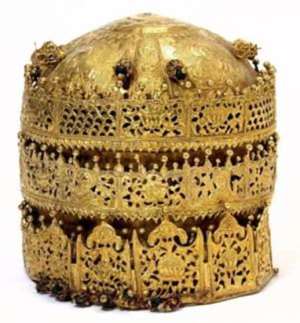
Most readers know by now that the defenders of the looting of African cultural artefacts are very active and surprise us often by their sheer inventiveness and ability to find new defences for what, under all circumstances, cannot be defended: colonial looting of African artefacts with violence and military power and their further retention despite all rules and regulations of the international community. The latest invention of the supporters of the universal museum comes from Tristram Hunt, Director, Victoria and Albert Museum, London, which holds, inter alia, a considerable number of looted Ethiopian artefacts stolen by the British in their notorious invasion of Ethiopia in 1860, attacking the Emperor Tewodros II at Magdala who committed suicide in preference to surrender to the violent invaders. (1)
In an article published in the British Guardian,29 June 2019,under the title, Should museums return their colonial artefacts? Hunt boldly declares:
‘For a museum like the V&A, to decolonise is to decontextualize: the history of empire is embedded in its meaning and collections, and the question is how that is interpreted. A more nuanced understanding of empire is needed than the politically driven pathways of Good or Bad. For alongside colonial violence, empire was also a story of cosmopolitanism and hybridity: through trade, religion, war and force, peoples and cultures mixed and, in many cases, expressed that exchange and interaction through the type of material culture now found in museums.’(2)
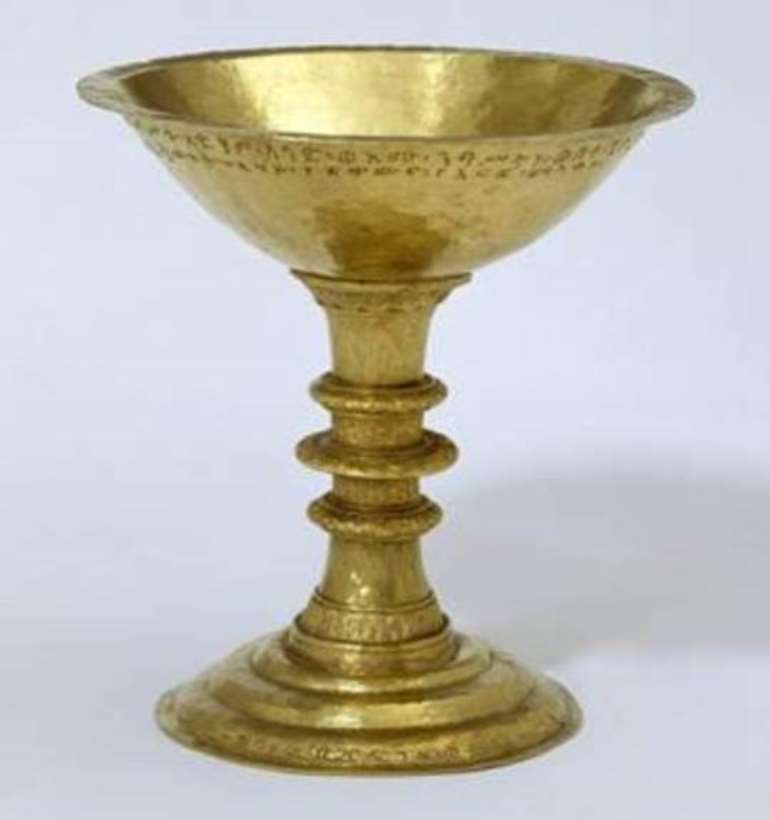
Gold chalice from Ethiopia looted by British soldiers at Maqdala now at Victoria and Albert Museum, London, United Kingdom.
It is often difficult to tell whether some of the pronouncements of museum directors are to be taken seriously or consigned to the category of bad jokes. But a statement such as that quoted above from a director of one of the most important museums in the world, known for its great number of looted artefacts from Africa, Asia, the Americas and Oceanian, must be accorded some attention even if at first glance it seems obviously wrong.
As readers know, there is a mounting pressure on the large museums holding looted artefacts to send some of them to their original owners in Africa and elsewhere. There has been the famous declaration by President Macron at Ouagadougou on 28 November 2017 and the subsequent Sarr-Savoy report recommending restitution of objects taken without the consent of the owners. Group of European museums holding looted Benin objects are in discussion with Benin/Nigeria over the return of the Benin artefacts. UNESCO has held conferences urging return of the artefacts. In the midst of all these attempts comes a director of a museum holing looted artefacts who declares:
‘For a museum like the V&A, to decolonize is to decontextualize‘ What does he mean?
To decolonize has meant that the colonial State withdraws from the colony and allows it to become free and independent. Recently many have called on the imperialist museums such as British Museum or the Victoria and Albert to return artefacts looted in the colonial times. This demand has also been extended to other museums holding objects stolen from colonies to return them to the original owners
In normal language usage, to contextualise a subject matter or an object is to consider it in its context. To decontextualize an object, would be to take it out of its context, consider it out of its normal or original context or where it properly belongs.
Archaeologists and other scholars have always complained about non-archaeologists digging objects and and thus taking them out of their context, causing loss of other information that proper archaeologists might have been able to gather. The supporters of the universal museums, such as James Cuno have taken the position that so long as an object is interesting or has aesthetic value, one should not hesitate to acquire it even if it was looted.
What Hunt is saying then is that to return Ethiopian artefacts to Ethiopia would be to decontextualize them. Take them out of their context. Interesting enough, Hunt himself, in the same article, informs us how the British stole the Ethiopian articles from the 1868 invasion of Maqdala. Where then do the Maqdala treasures belong? What is their proper context? Hunt does not explicitly say that his museum, Victoria and Albert museum is the home or original context but from his general comments and tone, it is clear he is making the museum in South Kensington the home of the looted artefacts. But can he convince anyone of this line of thought? I do not think so. Once the story of the British invasion of Ethiopia is told, hardly anyone, except the British and other European aristocracy and ruling circles would support Hunt’s view.
In current usage, to decolonize a museum is more than returning the looted artefacts even though this primary sense of decolonization is a necessary step-forward.
Decolonization requires that the museums, usually born in the colonial period divests itself from all colonialist ideologies and links stemming from colonialist connections. They would have to abandon the racist classification that puts Western Europeans and their related peoples on top of the human scale of development. They will have to cease investing in colonial or neo-colonial enterprises that make profit at the costs of non-white peoples or that produce weapons used to kill peoples from non-Western culture. The museums would also have to take into account the need for diversity in its staff as regards recruitment. In short decolonization of museums is a wider subject that Hunt seems to realize. The museum must indeed sever its umbilical cord from Western imperialism, abandoning all the prejudices that came with the birth of the universal museum and anthropology. A daunting task.
The argument that decolonization is decontextualization is also not valid from the implications of the idea. Implicit here is that all those with claims against museums such British Museum, Victoria and Albert Museum, Louvre, World Museum, Vienna, Humboldt forum/Ethnology Museum, Berlin, must abandon their claims if they do not want to be accused of decontextualization. All that the imperialist museum would need to do is to follow Hunt’s logic and deny their own original context, based on recorded history, including the history of the Ethiopian artefacts as recounted by Hunt himself. Whilst attributing to himself and his supporters a more nuanced understanding of empire, he attributes to his opponents politically driven pathways of Good or Bad. This is an old ploy of the supporters of the universal museum. Their motives are non-political, but their opponents are, somehow infected by rabid politics.
Hunt who has not lived under the British colonial regime seems to attach great importance to the British Empire: . For alongside colonial violence, empire was also a story of cosmopolitanism and hybridity: through trade, religion, war and force, peoples and cultures mixed and, in many cases, expressed that exchange and interaction through the type of material culture now found in museums.’
Hunt cannot probably understand that most of those who lived under colonial regimes remember mostly the violent and oppressive nature of the system. He should read a little more about the wars of liberation and the sufferings of the people of Angola, Mozambique, Cape Verde and the racism that prevailed not only in apartheid South Africa. Hunt should talk to those who as schoolchildren were made to walk under the scorching African sun on at mid-day on Empire Day.
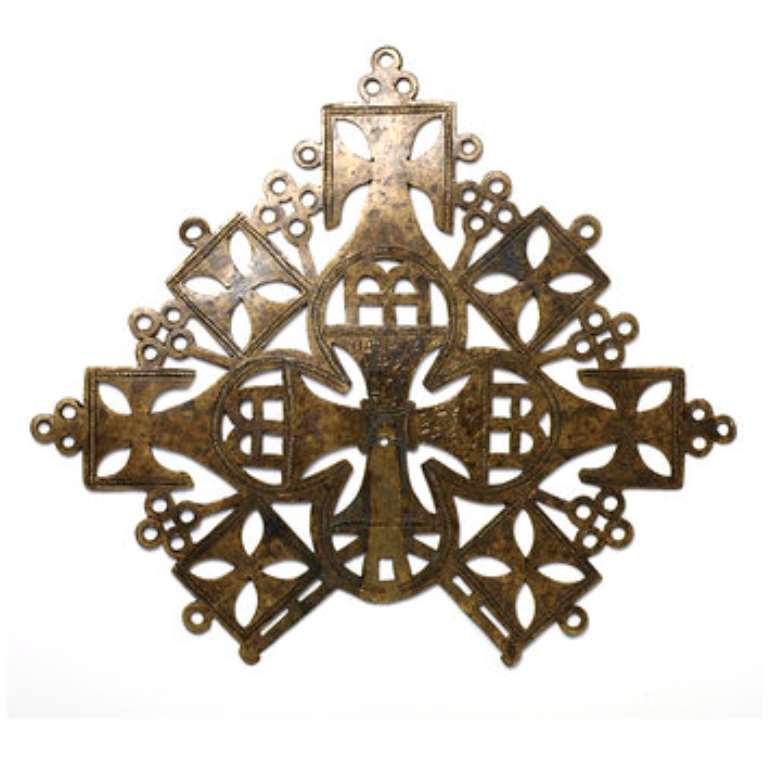
Processional Cross, Ethiopian Orthodox Church, Ethiopia ,now in Victoria and Albert Museum ,London.
We will not comment on Hunt’s description of developments relating to requests for restitution except to say he seems now to have read Macron’s statement at Ouagadougou which he now cites correctly as compared to his previous newspaper interviews.
Although Hunt seems to be distancing himself from the Declaration on the Importance and Value of the Universal Museum, his own position is not far from what he calls ’the bullish defence of western, encyclopaedic museums articulated in the 2002 “declaration on the importance and value of universal museums” , signed by 18 prominent institutions including the Louvre and New York’s Metropolitan Museum’.(3)
We would also refrain from commenting on some of Hunt’s provocative statements: ‘Perhaps the real challenge is how we create more, rather than fewer, universal museums – not in Europe and the west, but across Africa, India and the global south. Our aim should be to detach the universal, encyclopaedic museum from its colonial preconditions and reimagine it as a new medium for multicultural understanding’. Hunt seems to have taken this idea from James Cuno. (4)
The insensitivity here is typical of many of the declarations of the supporters of the universal museum. Are we reading the same history ? Abomey,1892, Benin,1897, Beijing, 1860, Ségou, 1890, Kumasi,1874, and Maqdala,1868
They know what these voracious, monstrous omnivorous citadels of loot mean to Africans and Asians, but do they care?
Hunt and other supporters of the universal museum should rest assured. Our main concern is not the history of the empire or colonialism or of the universal museum, however important that may be. Our concern is not with the past, however enlightening that may be for understanding the present situation nor do we seek, as it were, to re-write history(assuming this was ever possible). Our main concern is with the present imbalance of the distribution of African artefacts, where the large majority of the qualitatively better African objects are in the Western world whereas many African countries have little to show of their own culture. We do not seek to apportion blame. We do not seek to castigate the British and their allies for the invasion of 1897 that led to looting of thousands of Benin artefacts from the palace of Oba Ovonramwen. One is scandalized to realize that the Ethnology Museum/Humboldt Forum have some 580 Benin artefacts and that the British Museum has between 300-900 Benin artefacts and are not willing to share with Benin or tell us exactly how many they really hold. It is often said Benin artefacts are spread all over the world. That is not exactly correct. Benin artefacts are spread all over the Western world. Most African countries do not have any.
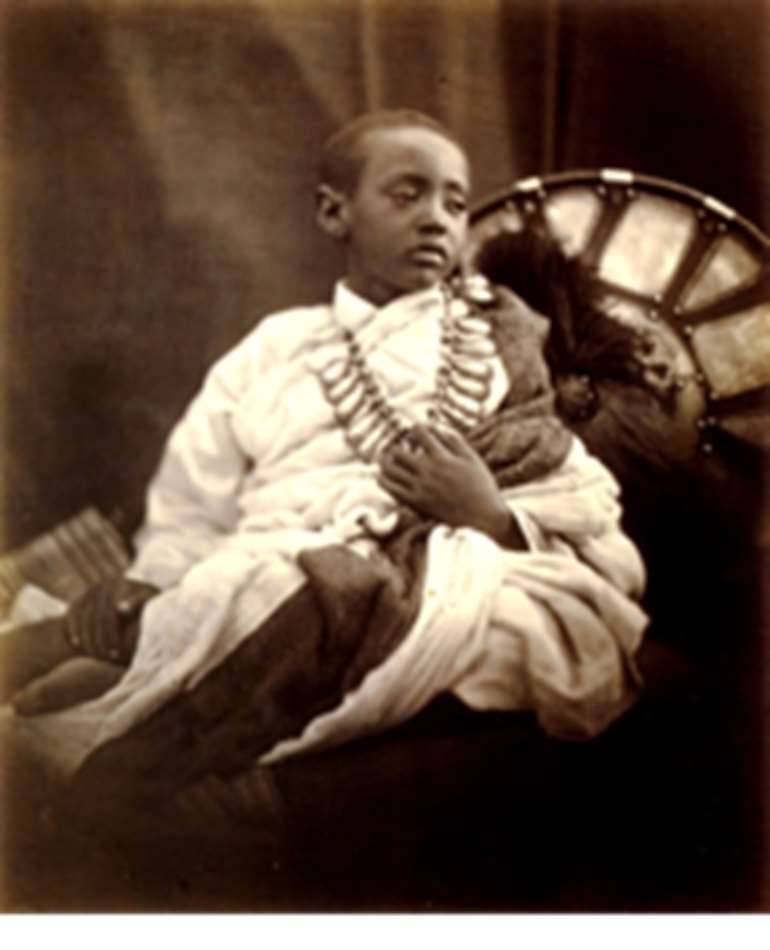
Prince Alemayehu, as photographed by Julia Margaret Cameron at the Isle of Wight in 1868. When will Britain return to Ethiopia the human remains of Prince Alemayehu, son of Emperor Tewodros, who was stolen along with Ethiopian crosses and tabots and brought to Britain at the age of 7 where he died at the age of 18 and was buried in the Windsor Castle? Ethiopia has been seeking in vain the return of human remains of the prince. See Annex II.
Western institutions, including the Victoria and Albert Museum are holding thousands of looted Ethiopian artefacts. Requests by Ethiopia for restitution have resulted in no positive response except an offer of temporary loans which the proud Ethiopians have correctly rejected. Nor do the British offer to return the human remains of the young Ethiopian Prince Alemayehu who was abducted after his father, Emperor Tewodros II, had been defeated and had committed suicide in order to avoid surrender to the invaders.(5)
Hunt is like many Western museum directors. Instead of finding ways to reduce the pains of memory of colonial oppression and domination by at least offering to restitute some of the looted artefacts, they spend considerable energy and time by mounting arguments that basically insult Africans and those whose artefacts have been looted under colonial rule. They offer us temporary loans of our artefacts they stole with violence.(6) It would be better if they said nothing at all, instead of adding insults to injuries.
Kwame Opoku.
NOTES
1. Kwame Opoku - BRITISH MUSEUM TO LOAN LOOTED 'INVISIBLE ...
https://www.toncremers.nl/kwame-opoku-british-museum-to-loan-looted-invisible-eth.
Loan of Looted Ethiopian Treasures to Ethiopia - Modern Ghana
https://www.modernghana.com/.../loan-of-looted-ethiopian-treasures-to-ethiopia-must
Ethiopia: The Way in Demand for Restitution of African ... - afrikanet.info
www.afrikanet.info/.../ethiopian-president-shows-the-way-in-demand-for-restitution
When will the West return Ethiopia's treasures - Elginism
www.elginism.com/similar-cases/when-will-the-west-return-ethiopias..
2. Should museums return their colonial artefacts? | Tristram Hunt ...
https://www.theguardian.com/culture/.../29/should-museums-return-their-colonial-artefa.
3. Declaration on the Importance and Value of Universal Museums ...
https://www.modernghana.com/.../declaration-on-the-importance-and-value-of-univer...
Is the declaration on the importance of Universal Museums still valid?
www.elginism.com/similar-cases/is-the-declaration...universal-museums.../2764/
Kwame Opoku - DEFENCE OF “UNIVERSAL MUSEUMS” THROUH ...
https://www.toncremers.nl/kwame-opoku-defence-of-universal-museums-throuh-omis..
4. K. Opoku, Loan of looted Ethiopian treasures to Ethiopia: Must Europeans https://www.pambazuka.org/.../loan-looted-ethiopian-treasures-ethiopia-must-europea..
Anger mounts as UK museum offers to return looted Ethiopian ... https://ecadforum.com/.../anger-mounts-as-uk-museum-offers-to-return-looted-ethiopi.
5. See Annex I.
6. Museums Matter: In Praise of the Encyclopedic ... - Best books online
https://ligesoka.gq/museum.../james-cuno-museums-matter-in-praise-of-the-encyclope
Kwame Opoku: What Game Was James Cuno Playing in Davos ...
www.africavenir.org/.../kwame-opoku-what-game-was-james-cuno-playing-in-davos....
REVIEW OF JAMES CUNO'S WHO OWNS ANTIQUITY? Dr. Kwame ...
www.afrikanet.info/archiv1/index.php?option=com_content&task=view&id...
Kwame Opoku: Affirmations And Declarations: Review of James ...
www.africavenir.org/.../kwame-opoku-affirmations-and-declarations-review-of-james...
ANNEX I-
PRINCE ALEMAYEHU
See also, K. Opoku, Looted Ethiopian Tabot Concealed Permanently In Westminster ...https://www.modernghana.com/.../looted-ethiopian-tabot-concealed-permanently-in-w...
There is quite a lot of information on the tragic life of the Ethiopian Prince Alemayehu, son of Emperor Tewodros, who was stolen by the British after the defeat of Tewodros during the British invasion of Magdala in 1968 and his subsequent suicide. The British stole not only various precious Ethiopian artefacts and manuscripts but also the only son of their defeated enemy. The prince died at 18 a lonely death in Britain where he was taken at the age of seven.
I had intended to write about this child prince, taken away from his country and relatives to the cold land of those who had defeated his father and ultimately caused his suicide. But the more I read about Prince Alemayehu, the more depressed I became. In all the photos of the prince I could see sadness written on his face. How can the British who believe in monarchy not instinctively feel that the little prince should have been left in Ethiopia with his relatives rather than bring him to a land he did not know and a people, with a language he did not know? What did they really want to do with the Ethiopian prince? Kidnapping is seldom for a noble cause. More worrying is the refusal of Britain to return the human remains of Prince Alemayehu who is apparently buried in Windsor Castle. What do the British have to hide?
It would be interesting to know the implications from this statement, in Wikipedia: ’Initially, Empress Tiruwork had resisted Captain Speedy’s efforts to be named the child’s guardian and had even asked the commander of the British forces, Lord Napier, to keep Speedy away from her child and herself. After the death of the Empress however, Napier allowed Speedy to assume the role of caretaker. Upon the arrival of the little Prince’s party in Alexandria however, Speedy dismissed the entire Ethiopian entourage of the Prince much to their distress and they returned to Ethiopia.’
What were the grounds for Empress Tiruwork asking the British commander to keep Captain Speedy from her son and herself? Why did Napier ignore a mother’s plea for the protection of her only son and herself?
Did Queen Victoria who is said to have expressed her sadness at the death of the prince know anything about the character of Speedy that would have made him unsuitable as guardian of Prince Alemayehu? Could Victoria, as a mother not feel the need for Alemayehu to be with his own people? Why did the British not allow the Ethiopian prince to go back to his people as he often requested?
We may also consider this statement from the Victoria and Albert Museum
‘Prince Dèjatch Alamayou was the son of an Ethiopian emperor who committed suicide rather than surrender to the British in 1868. Captain Speedy brought the Prince to England and the orphan prince came to live on the Isle of Wight, where Queen Victoria took a particular interest in him, paying for his education and allowing him to be buried at Windsor Castle when he died of pleurisy aged eighteen’.
Dèjatch Alámayou & Básha Félika / King Theodore's Son & Captain ...
collections.vam.ac.uk/.../dejatch-alamayou-basha-felika-king-pho...
I hope one day we will get a full study on this statement by Lemn Sissay :
‘He was a foster child. He was taken away by the British army. They looked after him at first, but by the time he was 18, they got rid of him. They stopped giving Captain Speedy a stipend to look after him. Captain Speedy said he is out; then he went to the north of England, a place called Leeds and he died within a year. And they said he died of pleurisy . They said it was just a natural illness. No! Something else was going on there. Something else was going on there. Imagine, they looked after him until he was18, until then everything was fine. Then they got rid of him. He died, and they said he died of natural causes. Was that so?
Queen Victoria loved him, they said. Queen Victoria loved princes from India as well. We don’t know what was going on between Captain Speedy and Alemayehu. There are a lot of stories breaking in England about the abuse of children. We don’t know.’
To triumph against all odds | The Reporter Ethiopia English
https://www.thereporterethiopia.com/.../triumph-against-all-odds
The director of the Victoria and Albert Museum said in connection with the exhibition on Magdala that the British must face their history: ‘We should not to be afraid of history, even if it is complicated and challenging’
Are they doing that with respect to the little prince they stole in 1868 whose human remains they refuse to return despite several requests by the Ethiopian people and their government? Loan of Looted Ethiopian Treasures to Ethiopia - Modern Ghana
https://www.modernghana.com/.../loan-of-looted-ethiopian-treas ...
Prince Alemayehu - Wikipedia
https://en.wikipedia.org/wiki/Prince_Alemayehu
Ethiopians urge Britain to return bones of 'stolen' prince after 150 years
https://www.theguardian.com/.../ethiopians-urge-britain-return-b...
Prince Alemayehu Tewodros (1861-1879) - Find A Grave Memorial
https://www.findagrave.com › ... › Windsor › St George's Chapel
Ethiopia demands Queen returns prince - Telegraph
https://www.telegraph.co.uk/.../Ethiopia-demands-Queen-returns- ...
Runnymede Trust / Ethiopian Prince Alemayhu's remains must be sent ...
https://www.runnymedetrust.org/.../ethiopian-prince-alemayhus-r.
ANNEX II
KINGDOM OF BENIN AND REPUIBLIC OF BENIN.
I was very surprised to note that the Director of the Victoria and Albert, London, makes the same mistake as Western readers, confusing the Republic of Benin with the Kingdom of Benin:
In 2009, Egypt demanded that the Louvre return five fragments of a wall painting from the tomb of Tetaki, an 18th-dynasty noble. In 2012, Nigeria requested the return of 32 objects from the Museum of Fine Arts, Boston that had been looted by the British army during a raid on the Royal Palaces of Abomey in 1897. In 2017, a year after the president of Benin had made an official request to the French foreign ministry for the return of items taken during imperial occupation , Nigeria made a further request, asking the British Museum in London to return the celebrated Benin bronzes
The initial confusion of two different entities leads to consequential mistakes and confusion.
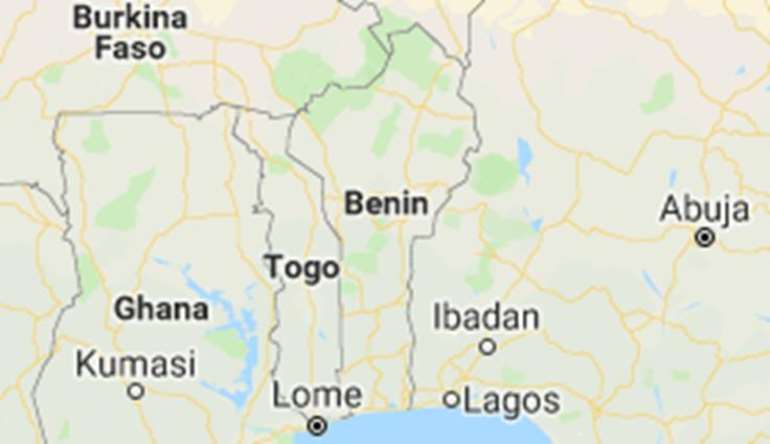
Map showing Benin and other West African States
The Republic of Benin is French-speaking country, adjacent to Togo on its west. It was called Dahomey as a French colony and only adopted the name Benin after Independence. Dahomey was also famous for its fearless army of female soldiers known as Amazons
Dahomey's Women Warriors | History | Smithsonian
https://www.smithsonianmag.com/history/dahomeys-women-warriors-88286072
Dahomey Amazons – Wikipedia
https://en.wikipedia.org/wiki/Dahomey_Amazons
Benin is bordered by Nigeria to the east, Togo on its west ,Burkina Faso and Niger, to its north. Capital of the republic is Porto Novo although the seat of government at Cotonou.
The historical Kingdom of Benin is in present day Nigeria which is English-speaking. The capital of the Kingdom, Benin City, was invaded in 1897 by British forces who stole 3000-4000 of the famous Benin artefacts, often called erroneously Benin bronzes.
The artefacts donated to the Museum of Fine Arts, Boston, were part of the British loot of 1897 from the palace of Oba Ovonramwen in Benin City. The British did not raid Royal Palaces in 1897 in Abomey, the capital of the ancient kingdom of Dahomey. The French army under general Dodds raided Abomey in 1892. The French stole the famous royal zoomorphic statues that are now in the Musée du Quai Branly and are to be returned to the Republic of Benin.
There is enough confusion in the following sentence:
‘In 2017, a year after the president of Benin had made an official request to the French foreign ministry for the return of items taken during imperial occupation , Nigeria made a further request, asking the British Museum in London to return the celebrated Benin bronzes ’.
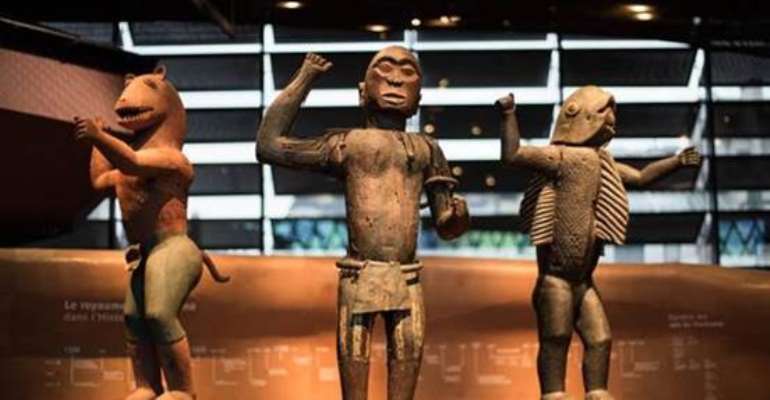
Royal statues, Dahomey, Republic of Benin, now in Musée du Quai Branly, Paris, France. Left, King Glélé, half-lion, half- man. Centre, King Ghézo, half-bird, half-man. Right, King Béhanzin, half-shark, half-man.
France Marches to Restitution of Looted African ... - Modern Ghana
https://www.modernghana.com/.../france-marches-to-restitution-of-looted-african-arte.
Kwame Opoku - France Marches to Restitution of Looted African ...https://www.toncremers.nl/kwame-opoku-france-marches-to-restitution-of-looted-afri...




 Transport fares hike: GPRTU issue two-day ultimatum
Transport fares hike: GPRTU issue two-day ultimatum
 ARC endorses Alan as presidential candidate – Buaben Asamoa
ARC endorses Alan as presidential candidate – Buaben Asamoa
 Akufo-Addo appoints Kwasi Agyei as new Controller and Accountant-General
Akufo-Addo appoints Kwasi Agyei as new Controller and Accountant-General
 PNC dismiss reports of mass resignations
PNC dismiss reports of mass resignations
 PAC advocates for revenue collectors to be engaged on commission basis, not full...
PAC advocates for revenue collectors to be engaged on commission basis, not full...
 Akufo-Addo commissions Kumasi 1 Thermal Power Plant
Akufo-Addo commissions Kumasi 1 Thermal Power Plant
 Genser Energy commissions 110km of natural gas pipeline at Anwomaso
Genser Energy commissions 110km of natural gas pipeline at Anwomaso
 Naa Torshie calls for tolerance, peace ahead of 2024 election
Naa Torshie calls for tolerance, peace ahead of 2024 election
 Asantehene commends Matthew Opoku Prempeh for conceiving GENSER Kumasi Pipeline ...
Asantehene commends Matthew Opoku Prempeh for conceiving GENSER Kumasi Pipeline ...
 Let’s do away with ‘slash and burn politics’ in Ghana — Dr Adutwum
Let’s do away with ‘slash and burn politics’ in Ghana — Dr Adutwum
